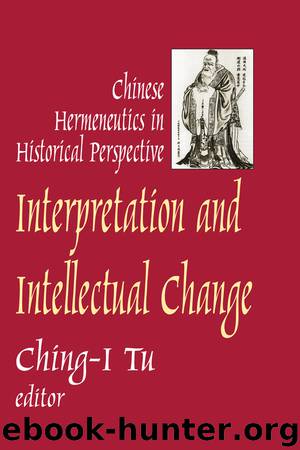Interpretation and Intellectual Change by Unknown

Author:Unknown
Language: eng
Format: epub
Publisher: Routledge
While this passage mentions that Liu Xianzhi “[wrote a] commentary (zhu) on Maoshi xuyi in one scroll,” a closer look reveals that this work is actually a yishu instead of a zhu.14 Similarly, Lu Deming (ca. 550-630) in the preface to his Jingdian shiwen gives a list of ten scholars who wrote commentaries on the Yijing, beginning with Xie Wan (320-361) and ending with Liu Huan (434-489). Lu also notes at the end of this list that “beginning with Xie Wan, these ten scholars all wrote zhu on the Xici.”15 But another note under Liu Huan says that “[his commentary on the Xici] was recorded in the Qilu under the title Xici yishu.”16 From this we can see that Liu Huan’s commentarial work on the Xici was alternatively referred to as both zhu and yishu, suggesting that the yishu was a special type of zhu and that the two were easily confused.
From the above we can deduce that works such as the Maoshi zhu written by Zhou Xuzhi (377-423)17 and the Lüezhu sangfu jingzhuan in one scroll by Lei Cizong (386-448)18 were actually works of the yishu type.19 In other words, we need not restrict our understanding of the nature of a work based solely on its title. For example, in the “Jingji zhi” of the Jiu Tangshu it says that Zhang Gai (fl. 420-478) wrote a zhu entitled Song qunchen jiang yi shu and Zhang Ji (514-589) wrote a zhu entitled Zhouyi jiangshu.20 The description here seems unreasonable, but the cause of the mistake is quite understandable.
The term yishu, referring to works of this type, is also a generalized term. From works for which we have concrete evidence, we can see that works that fit the yishu format are referred to alternatively as yishu, jiangshu (explanatory subcommentaries), yi (exegeses), yiji (exegetical records), yilue (exegetical summaries), yizhang (chapter exegeses), wenju yishu (sentence exegetical subcommentaries), siji (personal [exegetical] records), and shuyi (narrative exegeses), etc. The use of a specific name might have something to do with the content of the individual work. Unfortunately, however, very few works from the Northern and Southern Dynasties have survived to the present day, and there is no concrete evidence to work with. Consequently, scholars also used the term yishu as a general term.
Download
This site does not store any files on its server. We only index and link to content provided by other sites. Please contact the content providers to delete copyright contents if any and email us, we'll remove relevant links or contents immediately.
| Africa | Americas |
| Arctic & Antarctica | Asia |
| Australia & Oceania | Europe |
| Middle East | Russia |
| United States | World |
| Ancient Civilizations | Military |
| Historical Study & Educational Resources |
Room 212 by Kate Stewart(5123)
The Crown by Robert Lacey(4817)
Endurance: Shackleton's Incredible Voyage by Alfred Lansing(4783)
The Iron Duke by The Iron Duke(4356)
The Rape of Nanking by Iris Chang(4213)
Joan of Arc by Mary Gordon(4113)
Killing England by Bill O'Reilly(4004)
Say Nothing by Patrick Radden Keefe(3987)
I'll Give You the Sun by Jandy Nelson(3448)
Shadow of Night by Deborah Harkness(3368)
Hitler's Monsters by Eric Kurlander(3343)
Mary, Queen of Scots, and the Murder of Lord Darnley by Alison Weir(3210)
Blood and Sand by Alex Von Tunzelmann(3205)
Eleanor & Park by Rainbow Rowell(3176)
Darkest Hour by Anthony McCarten(3133)
Margaret Thatcher: The Autobiography by Thatcher Margaret(3083)
Book of Life by Deborah Harkness(2939)
Red Famine: Stalin's War on Ukraine by Anne Applebaum(2934)
The One Memory of Flora Banks by Emily Barr(2863)
